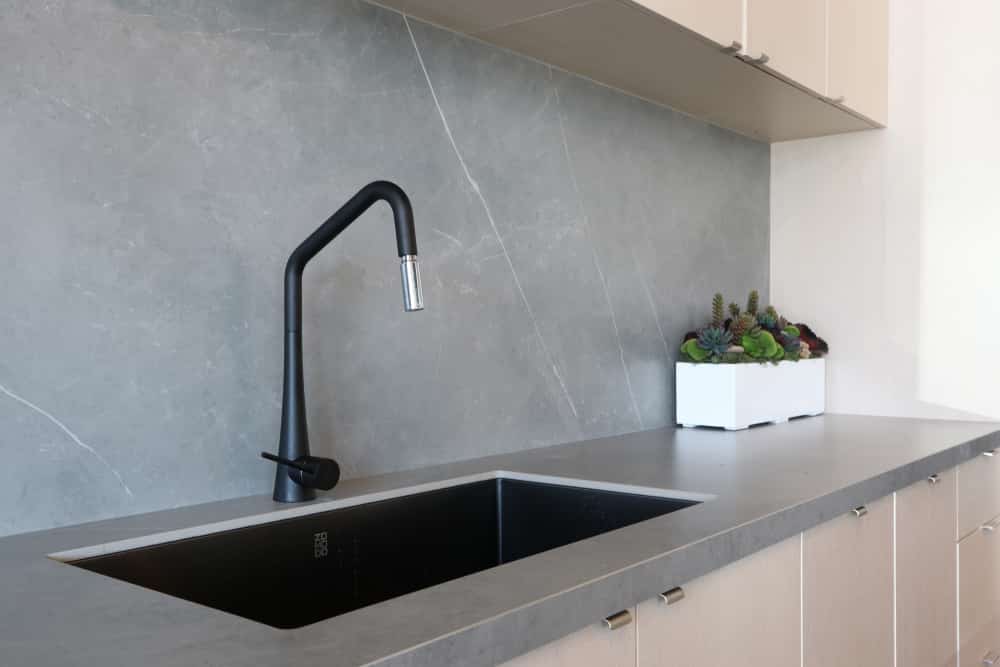When considering which material you want for your kitchen countertops, don’t discount the many benefits of soapstone, which has actually been a favorite of sculptors for centuries. It has talc in it, which makes it relatively soft — similar in hardness to marble. But what soapstone lacks in hardness, it makes up for in added density.
Soapstone particles happen to be very compact, more so than those of marble, quartz and granite. Translation? Soapstone is more sanitary and easier to wipe clean due to its smoothness. Plus, you don’t have to worry about applying a sealant for added protection. Thanks to its impenetrable surface, the risk of bacterial growth is low – a desirable quality you want to see in a kitchen or bathroom.
This material is often used in fireplace construction, which means it’s one of the most heat-resistant stones around. Go ahead and set a hot pan on your countertop – it won’t leave a scorch mark. All of that being said, soapstone does tend to darken over time, thanks to a natural process that’s similar to oxidation. This means it will eventually develop a distinct patina that you will either find appealing and not. The main downside to soapstone is its tendency to chip or scratch under heavy wear. So, you can’t drop a heavy cast-iron skillet on the counter, or chop food directly on the surface.
Benefits Of Soapstone
Other than that, there are many benefits to soapstone. Let’s explore more advantages. While granite is thought of as the classic high-end kitchen countertop material, and engineered materials like quartz and recycled glass are very trendy right now, there’s no reason why you should follow the crowd.
Soapstone is making its own trends, showing up more and more in homes across America. This smooth material is unique and beautiful, derived from the naturally-occurring stone known as steatite. This is a magnesium-rich metamorphic rock that comprises a high percentage of talc, which is the substance found in baby powder.
Artistic soapstone, which includes the softer varieties, has a soapy, silky feel to it, because it can contain up to 80% talc. It’s been used for carving for centuries, which is why it’s so misunderstood in these modern times — many homeowners mistakenly believe this material is too soft for a countertop. Not so.
The type of stone used in countertops and fireplaces is called architectural soapstone, comprised of only 30% talc. As a result, it’s quite hard and is well-suited for being cut into slabs. Soapstone is actually less porous and less susceptible to staining than granite, and is a smidge harder than marble.
Soapstone slabs come in creamy shades ranging from white to dark gray, with subtle veining throughout. It has a less dramatic appearance than granite, but many homeowners like this subtle beauty as compared with the loud exuberance that comes with granite.
Here are some more pros of soapstone:
- Soapstone doesn’t stain, compared with granite and marble which tend to stain easily.
- You can sand scratches and dents out of soapstone, then re-oil it with mineral oil.
- Soapstone’s appearance is classically antique, especially as age and wear occurs to the countertop over time.
- No sealing is required, compared with granite and marble which have to be sealed once a year.
- Soapstone is immune to scorches and burns.
In the end, soapstone countertops make a great choice for homeowners who prefer the old-time charm of counters that develop an antique patina over the years. Ideal for classic kitchen styles, soapstone is easier to care for and more charming than many other natural or engineered stone materials.
Contact Granite Guy
To learn more about our soapstone countertops and to get a free quote, contact us at 508-460-7900 or email us at info@graniteguyinc.com.
Fabrication and installation of quality soapstone kitchen countertops, bathroom vanities and surrounds for Eastern Massachusetts. Located 20 minutes from Boston on Route 9 in Southborough, MA

